Hyundai Staria vs Genesis GV80 – Which car suits you better?
Both models have their strengths – but which one suits you more?
Compare performance, efficiency, price and space directly: Hyundai Staria or Genesis GV80?
Here’s where it gets real: The technical differences in detail
Costs and Efficiency: Price and efficiency are often the first things buyers look at. Here it becomes clear which model has the long-term edge – whether at the pump, the plug, or in purchase price.
Hyundai Staria has a distinct advantage in terms of price – it starts at 42400 £, while the Genesis GV80 costs 59400 £. That’s a price difference of around 16954 £.
Fuel consumption also shows a difference: the Hyundai Staria manages with 7.60 L and is therefore slightly more efficient than the Genesis GV80 with 8.80 L. The difference is about 1.20 L per 100 km.
Engine and Performance: Under the bonnet, it becomes clear which model is tuned for sportiness and which one takes the lead when you hit the accelerator.
When it comes to engine power, the Genesis GV80 has a clearly perceptible edge – offering 304 HP compared to 225 HP. That’s roughly 79 HP more horsepower.
In acceleration from 0 to 100 km/h, the Genesis GV80 is significantly quicker – completing the sprint in 6.90 s, while the Hyundai Staria takes 10.20 s. That’s about 3.30 s faster.
In terms of top speed, the Genesis GV80 performs distinct better – reaching 237 km/h, while the Hyundai Staria tops out at 167 km/h. The difference is around 70 km/h.
There’s also a difference in torque: the Genesis GV80 pulls clearly perceptible stronger with 588 Nm compared to 367 Nm. That’s about 221 Nm difference.
Space and Everyday Use: Cabin size, boot volume and payload all play a role in everyday practicality. Here, comfort and flexibility make the difference.
Seats: Hyundai Staria offers evident more seating capacity – 9 vs 7.
In curb weight, the Genesis GV80 is slight lighter – 2155 kg compared to 2275 kg. The difference is around 120 kg.
In terms of boot space, the Hyundai Staria offers somewhat more room – 831 L compared to 735 L. That’s a difference of about 96 L.
In maximum load capacity, the Genesis GV80 performs noticeable better – up to 2152 L, which is about 849 L more than the Hyundai Staria.
When it comes to payload, Hyundai Staria a bit takes the win – 775 kg compared to 690 kg. That’s a difference of about 85 kg.
All in all, the Genesis GV80 shows itself to be outperforms in nearly all aspects and secures the title of DriveDuel Champion.
It impresses with the more balanced overall package and proves to be the more versatile companion for everyday use.
Hyundai Staria
The Hyundai Staria stands out with its futuristic design, characterised by sleek lines and an expansive front grille that makes a bold statement on the road. Inside, it offers a spacious and versatile interior, providing a comfortable ride for both driver and passengers. This vehicle effortlessly combines practicality with a touch of luxury, appealing to families and professionals alike.
details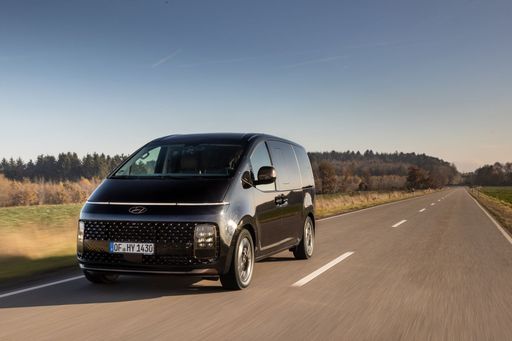 @ hyundai.news
@ hyundai.news
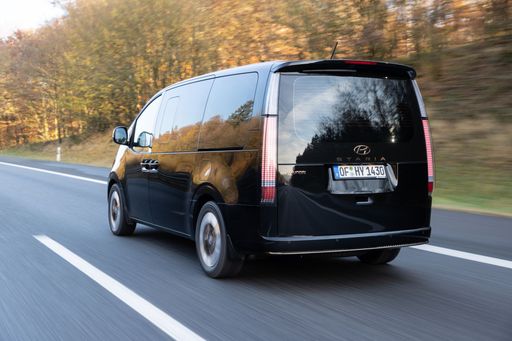 @ hyundai.news
@ hyundai.news
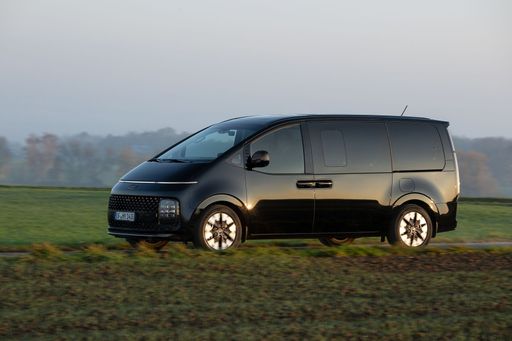 @ hyundai.news
@ hyundai.news
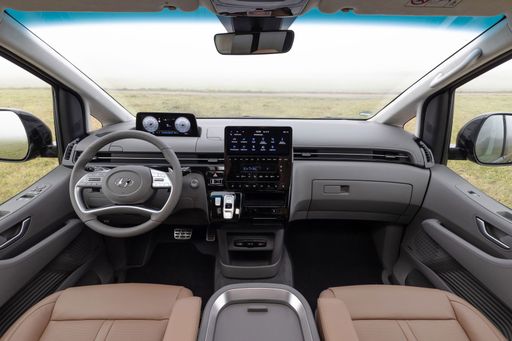 @ hyundai.news
@ hyundai.news
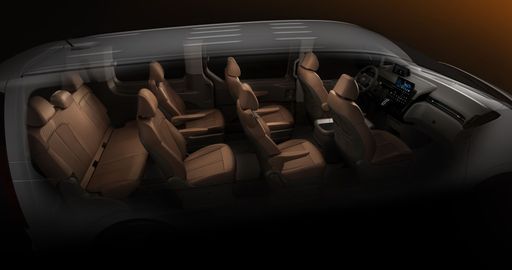 @ hyundai.news
@ hyundai.news
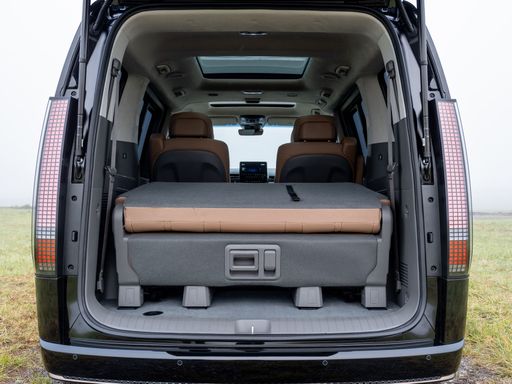 @ hyundai.news
@ hyundai.news
Genesis GV80
The Genesis GV80 impresses with its refined design and luxurious interior, offering an opulent driving experience that stands out in the luxury SUV segment. It delivers exceptional comfort and advanced technology features that enhance both driver and passenger enjoyment. The GV80 combines style and performance seamlessly, making it a compelling choice for those seeking sophistication on the road.
details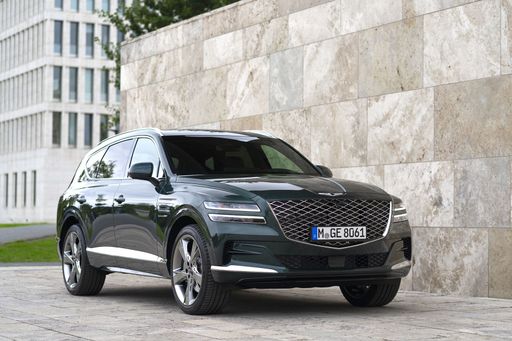 @ Genesis
@ Genesis
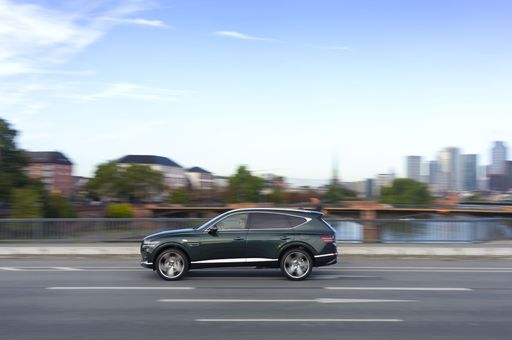 @ Genesis
@ Genesis
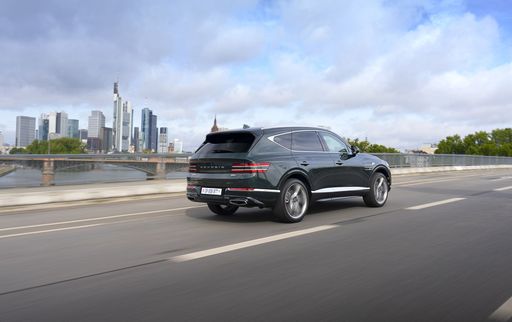 @ Genesis
@ Genesis
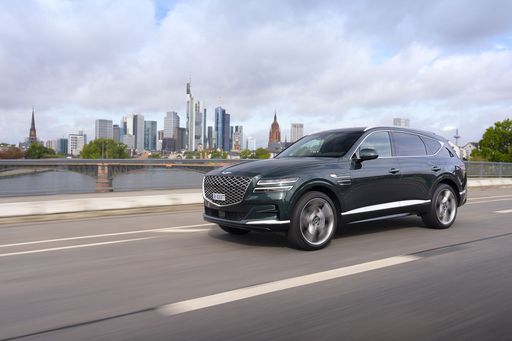 @ Genesis
@ Genesis
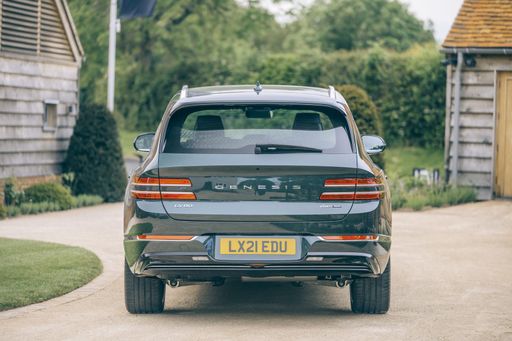 @ Genesis
@ Genesis
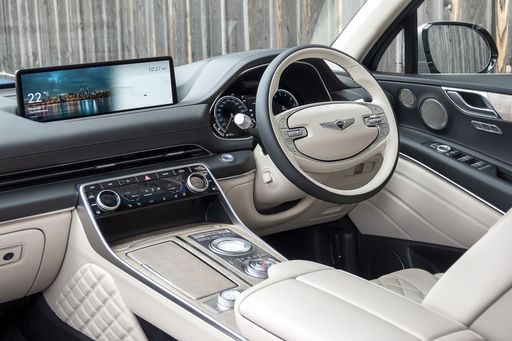 @ Genesis
@ Genesis

|

|
|
|
|
Costs and Consumption |
|
|---|---|
|
Price
42400 - 50500 £
|
Price
59400 - 75600 £
|
|
Consumption L/100km
7.60 L
|
Consumption L/100km
8.8 - 10.8 L
|
|
Consumption kWh/100km
-
|
Consumption kWh/100km
-
|
|
Electric Range
-
|
Electric Range
-
|
|
Battery Capacity
-
|
Battery Capacity
-
|
|
co2
172 g/km
|
co2
231 - 241 g/km
|
|
Fuel tank capacity
65 L
|
Fuel tank capacity
80 L
|
Dimensions and Body |
|
|---|---|
|
Body Type
Bus
|
Body Type
SUV
|
|
Seats
7 - 9
|
Seats
5 - 7
|
|
Doors
5
|
Doors
5
|
|
Curb weight
2275 - 2345 kg
|
Curb weight
2155 - 2325 kg
|
|
Trunk capacity
117 - 831 L
|
Trunk capacity
727 - 735 L
|
|
Length
5253 mm
|
Length
4945 mm
|
|
Width
1997 mm
|
Width
1975 mm
|
|
Height
1990 mm
|
Height
1715 mm
|
|
Max trunk capacity
431 - 1303 L
|
Max trunk capacity
2144 - 2152 L
|
|
Payload
605 - 775 kg
|
Payload
660 - 690 kg
|
Engine and Performance |
|
|---|---|
|
Engine Type
Full Hybrid
|
Engine Type
Petrol, Diesel
|
|
Transmission
Automatic
|
Transmission
Automatic
|
|
Transmission Detail
Automatic Gearbox
|
Transmission Detail
Automatic Gearbox
|
|
Drive Type
Front-Wheel Drive
|
Drive Type
All-Wheel Drive
|
|
Power HP
225 HP
|
Power HP
272 - 304 HP
|
|
Acceleration 0-100km/h
10.20 s
|
Acceleration 0-100km/h
6.90 s
|
|
Max Speed
167 km/h
|
Max Speed
230 - 237 km/h
|
|
Torque
367 Nm
|
Torque
422 - 588 Nm
|
|
Number of Cylinders
4
|
Number of Cylinders
4 - 6
|
|
Power kW
165 kW
|
Power kW
200 - 224 kW
|
|
Engine capacity
1598 cm3
|
Engine capacity
2497 - 2996 cm3
|
General |
|
|---|---|
|
Model Year
2024
|
Model Year
2021 - 2022
|
|
CO2 Efficiency Class
F
|
CO2 Efficiency Class
G
|
|
Brand
Hyundai
|
Brand
Genesis
|
What drive types are available for the Hyundai Staria?
The Hyundai Staria is available as Front-Wheel Drive.
The prices and data displayed are estimates based on German list prices and may vary by country. This information is not legally binding.
